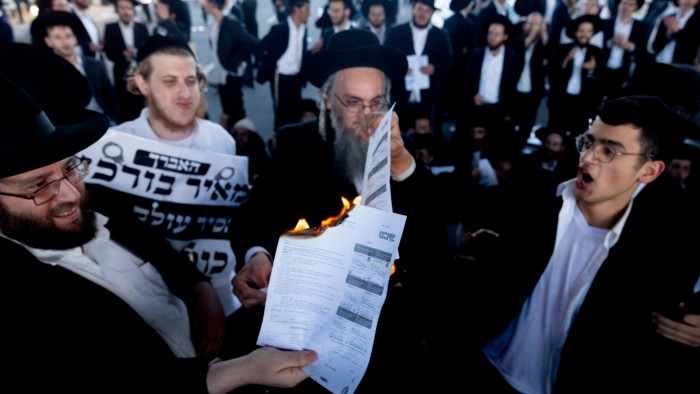Unlock the Editor’s Digest for free
Roula Khalaf, Editor of the FT, selects her favourite stories in this weekly newsletter.
Benjamin Netanyahu suffered another setback on Wednesday when the ultraorthodox Shas party pulled out of his government over its failure to pass legislation exempting religious students from military service.
The move by Shas came two days after United Torah Judaism — a second, smaller ultraorthodox party — quit Netanyahu’s far-right coalition over the same issue, leaving it with just a one-seat majority in the Israeli parliament.
However, while the move by Shas underscores the divisions in Netanyahu’s originally six-party coalition, it will not automatically trigger early elections or bring down the government.
Unlike UTJ, Shas — the second-biggest party in Netanyahu’s coalition — said that even as it left the government it would remain in the governing coalition in parliament and would not work to topple Netanyahu’s administration.
Announcing the move, Michael Malchieli, Shas’s outgoing religious services minister, said the government’s failure to enshrine in law the decades-old exemption from military service for religious students — a long-standing demand of the two ultraorthodox parties — had left Shas with no choice but to depart.
However, he stressed that Shas would not, for now, work to unseat the government. “We will not co-operate with the left,” Malchieli said in a statement.
The dispute over conscripting religious students has been one of the most divisive issues in Israeli politics, as well as a faultline in Netanyahu’s coalition. In addition to the two ultraorthodox, or Haredi, parties, it contains lawmakers who want to abolish the exemption altogether.
The issue has increased tension within the coalition over the past two years as the war in Gaza has strained the military’s resources, and as the army has begun issuing summonses to young Haredi men after the country’s top court ruled the exemption unconstitutional.
Opposition politicians seized on Shas’s move to demand that elections, not scheduled to be held until October next year, be brought forward. They say Netanyahu in effect now leads a minority government and does not have a mandate to make crucial decisions about Israel’s future.
“A minority government cannot send soldiers to battle. A minority government cannot decide who will live and who will die,” said Yair Lapid, head of the largest opposition party, Yesh Atid.
“A minority government cannot decide the fate of Gaza, reach arrangements with Syria or Saudi Arabia.”
However, unless the ultraorthodox parties join the opposition in working to topple the government, it has little chance of forcing early elections.
The parliament will go into summer recess on July 27 until October. During this lull it will be extremely difficult to introduce resolutions to replace an existing government or dissolve parliament.
Recommended
Negotiations with the ultraorthodox parties could also produce a compromise bill more to their liking, paving the way for their return to government.
The exemption from Israeli’s military conscription stems from a 1948 deal between Israel’s founding prime minister, David Ben-Gurion, and the ultraorthodox community, which allowed 400 young Haredi men to avoid armed service if they were enrolled in a yeshiva, or religious school.
The arrangement — and state subsidies for yeshiva students — has become a source of increasing frustration for other Israelis as the number of ultraorthodox Jews exempted from the military has soared, along with the growth of the Haredi population, to more than 80,000.

